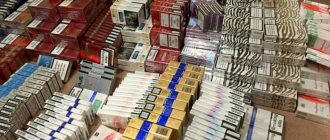Quite an extensive article. 226.1 of the Criminal Code of the Russian Federation establishes criminal liability for the illegal movement across the border of the customs union or the State border of the Russian Federation (smuggling) of potent, poisonous, poisonous, explosive, radioactive substances, radiation sources, nuclear materials, firearms or their main parts, explosive devices, ammunition, weapons mass destruction, means of its delivery, other weapons, other military equipment, as well as materials and equipment that can be used in the creation of weapons of mass destruction, means of delivery, other weapons, other military equipment, as well as strategically important goods and resources or cultural valuables or especially valuable wild animals and aquatic biological resources.
It would seem that this provision of criminal law exists to suppress extremely serious crimes, but in practice everything is much more prosaic. Recently, more and more often for smuggling under Art. 226.1 of the Criminal Code of the Russian Federation, athletes who use hormonal drugs to achieve sports results are subject to criminal liability. Decree of the Government of the Russian Federation of December 29, 2007 N 964 “On approval of lists of potent and toxic substances for the purposes of Article 234 and other articles of the Criminal Code of the Russian Federation, as well as large quantities of potent substances for the purposes of Article 234 of the Criminal Code of the Russian Federation” defines a list of prohibited potent substances substances, including steroids, including various testosterone esters (sustanon, propionate, enanthate, etc.), methandrostenolone, nandrolone, trenbolone, stanozolol, oxandrolone, masteron, oxymetholone, trenbolone, boldenone - for illegal trafficking of these steroid hormonal drugs criminal liability. This list is also applicable for the purposes of Art. 226.1 of the Criminal Code of the Russian Federation, that is, for moving steroids across the state border, no matter how, criminal liability for smuggling is provided.
How everything happens in practice. Most often, an athlete who wants to purchase steroids for his own consumption orders illegal drugs by mail via the Internet. The fundamental point here is where, in what country the seller is located and whether steroids will be sent from abroad to the territory of the Russian Federation. Quite a lot of sellers of steroid hormones are located in other neighboring countries, such as Belarus, Moldova, and Ukraine. The fact is that currently on the territory of these states, steroids are not prohibited and are sold as ordinary drugs, although they are potent, but there is no criminal liability for the trafficking of them. After ordering and payment by the buyer, the seller sends potent drugs from the territory of another state by mail to the buyer in Russia. As part of operational search operations, a parcel with steroids is tracked already on the territory of the Russian Federation and the recipient is detained at the post office upon receipt as a smuggler.
It is noteworthy that for the distribution of steroids on the territory of the Russian Federation, without moving through the state. border, only the distributor (seller) is subject to criminal liability. In this case, Art. 234 of the Criminal Code of the Russian Federation Illegal trafficking of potent or toxic substances for the purpose of sale, that is, a buyer of steroids for personal consumption who does not have a sales goal is not subject to criminal liability.
As for the smuggling of other potent substances, which include, for example, various potent drugs used for recreational purposes to obtain a narcotic (intoxicating) effect, such as tramal, tramadol, phenobarbital, diazepam, as well as poisonous and toxic substances, and especially explosives and weapons, then within the framework of Art.
226.1 of the Criminal Code of the Russian Federation will have completely different specifics than when smuggling steroids. CRIMINAL LAWYER call now: ☎ 8 (495) 532-75-40
Protection under Art. 226.1 of the Criminal Code of the Russian Federation Smuggling of potent, poisonous and toxic substances
Protection under Art. 226.1 of the Criminal Code of the Russian Federation is based on countering the arguments of the prosecution. In this case, the intent to smuggle (move across the border) must be proven. When ordering steroids, the buyer often does not even understand where the drugs will be sent from; most Internet sites selling steroids either do not have signs of territorial affiliation, or contain contact information for users from Russia. The key point in steroid smuggling cases is how the customer behaves when detained at the post office. In such cases, internal affairs officers almost always begin to intimidate the detainee and force him to give testimony aimed at proving intent to smuggle, that the detainee knew where the drugs were sent from. In such cases, the best defense would be to refuse to give any explanation or testimony without a lawyer, refer to Art. 51 of the Constitution of the Russian Federation. After the first meeting with a lawyer, your situation will be fully analyzed and a line of defense will be developed, the lawyer will give you the most advantageous recommendations for defense.
The Constitutional Court and its judge disagreed in their assessments of the norm of Part 1 of Art. 266.1 of the Criminal Code on the smuggling of “other military equipment”
The Constitutional Court issued Ruling No. 2647-O on the complaint of a citizen convicted under Part 1 of Art. 226.1 of the Criminal Code of the Russian Federation for transporting across the border a pilot’s G-suit that was given to him as a gift, which the forensic examination classified as “other military equipment.”
Criminal case for receiving a gift
Sergey Baranov was the General Director of Russian Aviation Society LLC, one of the activities of which, as a subject of military-technical cooperation in the aviation market, is the supply of products for aviation equipment to foreign customers. For the society's anniversary, he was presented with an anti-g suit intended for use when piloting aircraft of the Armed Forces of the Russian Federation. Since Sergei Baranov carried the suit across the customs border of the Customs Union within the EurAsEC, he was convicted under Part 1 of Art. 226.1 CC.
According to the verdict of the Khimki City Court of the Moscow Region dated September 18, 2021, Sergei Baranov, the day after receiving the suit, intending to fly to Germany, placed it in his suitcase among his personal belongings, checked his luggage at the airport and proceeded along the “green corridor.” The customs control officer who stopped Baranov explained that he did not have any items prohibited for export across the customs border or exported through it according to special rules or on the basis of permits in his luggage.
Thus, he illegally carried contraband across the customs border - an anti-overload suit, classified by the court as “other military equipment.” The man was sentenced to imprisonment for a period of 3 years, which was considered suspended with a probationary period of 3 years.
The judicial panel for criminal cases of the Moscow Regional Court left the verdict unchanged.
Arguments of the complaint and the position of the Constitutional Court
Sergei Baranov appealed to the Constitutional Court. In the complaint, he indicated that Part 1 of Art. 226.1 of the Criminal Code contradicts the Constitution to the extent that it establishes criminal liability for acts involving the movement across the customs border of military equipment other than those specified in it, in the absence of a legislatively enshrined list of items related to it, providing clear and unambiguous criteria determining signs of smuggling allows the use of expert opinions for these purposes, thereby creating the possibility of ambiguous interpretation and, consequently, arbitrary application of this norm.
Refusing to accept the complaint for consideration, the Constitutional Court noted that the blanket method of presenting articles of the criminal law in relation to establishing the range of items attributable to a particular crime is not limited to merely listing each of them by name through a complete list of them, specifically adopted for the purposes of a particular article. Achieving clarity on this issue can also be ensured by turning to the conceptual apparatus of normative acts of other branches that are systemically related to the criminal law, references to which are made or implied in blanket dispositions. The definitive norms contained in these acts, directly designating the scope, intended purpose and other characteristic (species) characteristics of the defined object, are also intended to serve to distinguish it from many other objects.
Thus, the Constitutional Court pointed out, in intersectoral connection with Art. 226.1 of the Criminal Code there are, for example, provisions of the Law on Military-Technical Cooperation of the Russian Federation with Foreign States, the List of Information Classified as State Secrets, the List of Dual-Use Goods and Technologies that can be used, which provide a legal definition of the concept of “military equipment” or indicate its varieties when creating weapons and military equipment and in respect of which export control is carried out, Regulations on licensing the development, production, testing, installation, assembly, maintenance, repair, disposal and sale of weapons and military equipment.
At the same time, the Court noted, items that fall within the scope of Art. 226.1 of the Criminal Code as weapons and military equipment, so rarely - taking into account the declared state monopoly - can legally end up in the possession of private individuals and, as such, become an object of movement across the border that the absence of a list of their names can be compensated by the possibility of establishing the purpose of this item, and therefore, the rules applicable when moving it across the border. In particular, if it is necessary to obtain additional information to determine whether a product is a military product, it is possible (including for individuals) to identify it (including as a product of military equipment), which is carried out in accordance with the Procedure for classifying goods, as well as information, works, services, results of intellectual activity for military products and the issuance of relevant conclusions by the Federal Service for Military-Technical Cooperation.
In addition, the Constitutional Court indicated that, according to judicial acts, Sergei Baranov admitted his guilt as charged, but did not appeal the verdict on appeal. During the consideration of the prosecutor's appeal, the defense asked to leave the verdict unchanged, however, drawing the court's attention to the fact that Baranov's actions did not cause damage to the protected interests; the anti-g suit found on him was not intended by the manufacturer for use as a means of supporting the life of military aircraft pilots .
In his complaint, the applicant argued that Part 1 of Art. 226.1 of the Criminal Code does not exclude the incrimination of smuggling due to an expert error or the unintentional commission of actions that formally form the corpus delicti envisaged by it. Meanwhile, the Court noted, the Code of Criminal Procedure, regulating the process of evidence, within the framework of which evidence is subject to assessment from the point of view of relevance, admissibility, reliability, and in their totality - sufficiency for resolving a criminal case, enshrines the principle of their free assessment: judge, jury, prosecutor , the investigator, the inquirer evaluates the evidence according to their inner conviction, based on the totality of the evidence available in the criminal case, guided by the law and conscience, and no evidence has a predetermined force. The Plenum of the Supreme Court also guides law enforcers to ensure such an approach, which in paragraph 19 of Resolution No. 28 of December 21, 2010 “On Forensic Expertise in Criminal Cases” explained that the expert’s conclusion does not have pre-established force, does not have an advantage over other evidence and , like all of them, is assessed according to general rules in conjunction with other evidence.
According to this Code, the Constitutional Court pointed out, a conviction cannot be based on assumptions and is decided only on the condition that during the trial the guilt of the defendant is confirmed by the totality of evidence directly examined by the court (Part 4 of Article 14, Parts 1 and 3 of Article 240 and part 4 of article 302), and the descriptive and motivational part of such a sentence must, among other things, contain the evidence on which the court’s conclusions regarding the defendant are based, and the reasons for which the court rejected other evidence (paragraph 2 of article 307) . “In addition, the criminal procedure law does not prevent the prosecution and defense from using, on the basis of adversarial and equal rights, any legal means of defending their interests in court, including objecting to the receipt and examination of evidence in a judicial investigation and challenging their admissibility and reliability, and the court is not exempt from the obligation to study the arguments of the parties and, if he has irremovable doubts about the admissibility and reliability of the evidence received by him or presented by the parties, to interpret the doubts in favor of the accused,” the Constitutional Court noted.
Opinion of judge Sergei Kazantsev
The Court's ruling contains the opinion of Constitutional Court judge Sergei Kazantsev, who did not agree with the refusal to accept the complaint. He considered that the basis for considering the case was the revealed uncertainty of the constitutionality of Part 1 of Art. 226.1 of the Criminal Code of the Russian Federation to the extent that it (in the absence of clear and consistent legal regulation of the procedure and conditions for the movement of “other military equipment” by individuals across the customs border of the Customs Union or the state border of the Russian Federation) does not allow these persons to realize the socially dangerous and illegal nature of their actions and to foresee their criminal legal consequences.
The federal legislator, as the judge emphasized, establishes criminal liability for the illegal movement across the border not of any military property (the term “military products” is more often used in legislation), but only of its most significant types. Illegal cross-border movement of other (not specified in the challenged norm) types of military products entails only administrative liability (for example, Article 16.2 of the Code of Administrative Offenses of the Russian Federation). Responsibility for the implementation of foreign economic actions involving the movement of components and technologies used for weapons of mass destruction, other types of weapons or other military equipment is established by Art. 14.20 Code of Administrative Offences.
Sergei Kazantsev noted that the disposition of Art. 226.1 of the Criminal Code is blanket; it does not define the criteria for classifying certain things as objects of criminal offense during their cross-border movement. The blanket nature of this norm makes it possible to establish the signs and specific characteristics of the items of encroachment listed in it only by searching for them in other branches of legislation, which is not an easy task for the law enforcement officer.
“Accordingly, assessing the certainty of the provisions of Art. 226.1 of the Criminal Code can be implemented only in connection with the provisions of an indefinite range of normative legal acts establishing either definition criteria or a list of items specified in it and the procedure for their movement across the customs border and the state border of the Russian Federation with member states of the Customs Union within the EurAsEC. It is assumed, as a general rule, that prohibitions and restrictions on the free cross-border movement of goods (works, services) must be expressed in a clear, unambiguous manner, especially when it comes to criminal liability,” the judge noted in the opinion.
With reference to the Constitutional Court Resolution No. 22-P of July 16, 2015, Sergei Kazantsev added that the Court had previously considered the constitutionality of the controversial article in terms of the movement by individuals of potent substances in medicines for personal use. Then the Constitutional Court took into account the blanket nature of the legal provisions under review and came to the conclusion that they were unconstitutional, also noting that the blanket nature of the norm itself does not guarantee its compliance with the basic law of the state. In addition, the highest court also pointed out that the absence of an indication of the type of normative act that should “establish order” could lead to a violation of the constitutional rights of citizens and arbitrary deprivation of their property (Resolution of the Constitutional Court of the Russian Federation of April 25, 1995 No. 3 -P).
The judge stated that it is much more difficult for a law enforcement official to find not only a list, but also a definition of the military items listed in the contested article. The most general definition of military products and their types is contained in the Law on Military-Technical Cooperation of the Russian Federation with Foreign States. According to Art. 6 of this law, the President approves the list of military products permitted for transfer to foreign customers. The list of hand-held small arms and ammunition and bladed weapons permitted for circulation on the territory of the state in accordance with the Weapons Law is contained in the state cadastre of civilian and service weapons. “The above regulations contain clearly inconsistent definitions of weapons and military equipment, as well as military property and military products,” noted Sergei Kazantsev.
“It should be noted that the applicant did not dispute either in the courts of general jurisdiction or in the Constitutional Court the fact that the anti-G suit (PPK-3) is a military product and that he committed an offense in the export of the G-suit without proper permission. But he did not know and could not know, despite his many years of experience in the defense industry, that in the process of law enforcement PPK-3 would not be classified as a life support system for armed forces personnel, not as special equipment or other type of “military property”, but to weapons and military equipment,” the opinion noted.
The classifier of military products, the import and export of which are carried out under licenses issued by the FSMTC, does not contain either a list of specific items that can be classified as “other military equipment”, nor a direct indication of anti-overload suits. “The assignment of the anti-overload suit to subcategory 4.2, allowed by the courts of general jurisdiction in the applicant’s case, is not justified in any way and raises doubts, but even if we allow the inclusion of PPK-3 in this category of the classifier, then, nevertheless, in accordance with the above provisions of Art. 1 of the Law on Military-Technical Cooperation of the Russian Federation with Foreign States, this in itself cannot serve as evidence that this suit is military equipment, since included in this subsection. 4 fuels and lubricants, oils and paraffins for military purposes can also hardly be classified as “military equipment”, as well as parachutes included in paragraph 15,” the judge believes.
He added that the List of dual-use goods and technologies that can be used in the creation of weapons and military equipment and which are subject to export controls also does not contain references to anti-g suits. This document classifies such a suit not even as a military product or military equipment, but as a dual-use product. In this regard, based on the analysis of the Commodity Nomenclature of Foreign Economic Activity, it was concluded that an anti-g suit, by its nature and for the purposes of customs regulation, can also be classified as a pilot’s clothing item.
“Thus, the legislation of the Russian Federation does not allow us to unambiguously determine whether an anti-G suit, being a military product, can at the same time be a dual-use product, despite the fact that on the territory of the country, regulations do not exclude the lawful possession and use of G-suits and persons who are not military personnel. This, apparently, should have been taken into account by the legislator when assessing the public danger of exporting such costumes from the territory of the Russian Federation,” summed up Sergei Kazantsev.
Experts on the determination of the Constitutional Court and the judge’s opinion
Lawyer of KMA “Verdict” Alexander Kotsyuba considered that the Court avoided assessing the conformity of the provisions provided for in Part 1 of Art. 226.1 of the Criminal Code regarding the establishment of criminal liability for the movement of other military equipment across the customs border. “In this ruling, the Court reproduced the conclusions formulated by it in earlier decisions on the admissibility of the blanket method of presenting articles of the criminal law, on the right of the state to establish restrictions on the circulation of military equipment,” the lawyer said.
In his opinion, this approach of the Constitutional Court is due to Baranov’s “appreciative” position in the criminal case. As a rule, Alexander Kotsyuba noted, the Constitutional Court considers complaints on the merits in cases where, as a result of the application of the contested norms of legislation, obvious, gross violations of the rights of the applicants are committed. “By pleading guilty to committing a crime and later refusing to appeal the conviction, the applicant actually admitted that he had not complied with the norms of legislation regarding the movement of items related to other military equipment across the customs border, and there is no uncertainty regarding the classification of the anti-overload suit to such technology,” said Alexander Kotsyuba.
The lawyer noted that in his opinion, Sergei Kazantsev showed that there may be different approaches to assessing what category of products an anti-g suit belongs to - military equipment or, for example, pilot clothing. In fact, the judge indicated the option by which Baranov could be defended in a criminal case: if he had argued that the anti-g suit was a pilot’s clothing and did not belong to other military equipment, the results of the consideration of the complaint in the Constitutional Court could have been different.
In conclusion, Alexander Kotsyuba noted that Art. 226.1 of the Criminal Code is an ordinary article of the Criminal Code, having a blanket design, therefore, the elimination of legal uncertainty should be done not by adjusting this article, but by introducing changes to the legal norms governing the circulation of military equipment.
Lawyer of the human rights organization “Soldiers' Mothers of St. Petersburg” Alexander Gorbachev drew attention to the difference in the approaches of the Constitutional Court and Sergei Kazantsev to the key fact contained in this legal dispute - the distribution of responsibilities between a citizen and the state.
In his opinion, the general conclusion of the Court is as follows: in order not to fall under the criminal article, a person must conduct an independent assessment (in fact, an expert assessment) of the item that he wants to export, or make a request to a government agency, which must provide appropriate explanations on a specific item. Judge Sergei Kazantsev points out that when assessing an item that a citizen wants to remove, there is actually an unlimited number of regulations in force that establish criteria for classifying an item as “other military equipment,” which makes it especially difficult for a law enforcement official to assess the legality of his actions with the removal of items, including number of dual-use items.
“A list of items that fall under Art. 226.1 of the Criminal Code or a single act establishing clear criteria for classifying items as prohibited for movement across the border,” suggested Alexander Gorbachev.
Lawyer under Art. 226.1 of the Criminal Code of the Russian Federation Smuggling of potent, poisonous and toxic substances
Lawyer under Art. 226.1 of the Criminal Code of the Russian Federation provides protection in cases of smuggling at all stages of criminal prosecution, starting with verification in accordance with Art. 144 – 145 of the Code of Criminal Procedure of the Russian Federation and before filing, if necessary, a complaint to the court of second instance against the verdict. Only the right actions and following the recommendations of a smuggling lawyer can help you get out of an unpleasant situation with minimal losses. If you or your relative are threatened with criminal prosecution for smuggling steroids under Art. 226.1 of the Criminal Code of the Russian Federation, contact a criminal lawyer for protection by calling the phone number listed on the website.
Commentary to Art. 226 Criminal Code
1. The subject of the crime differs in Part 1 and Part 2.
2. The objective side is characterized by alternatively provided actions in relation to the relevant items: a) their theft; b) their extortion. The content of the listed actions is disclosed in paragraphs 13, 15 - 18 of the Resolution of the Plenum of the Supreme Court of the Russian Federation of March 12, 2002 No. 5.
3. In qualified (clause "d" part 3) and especially qualified compositions (clause "b" part 4) liability for theft by robbery or robbery is provided, respectively.





